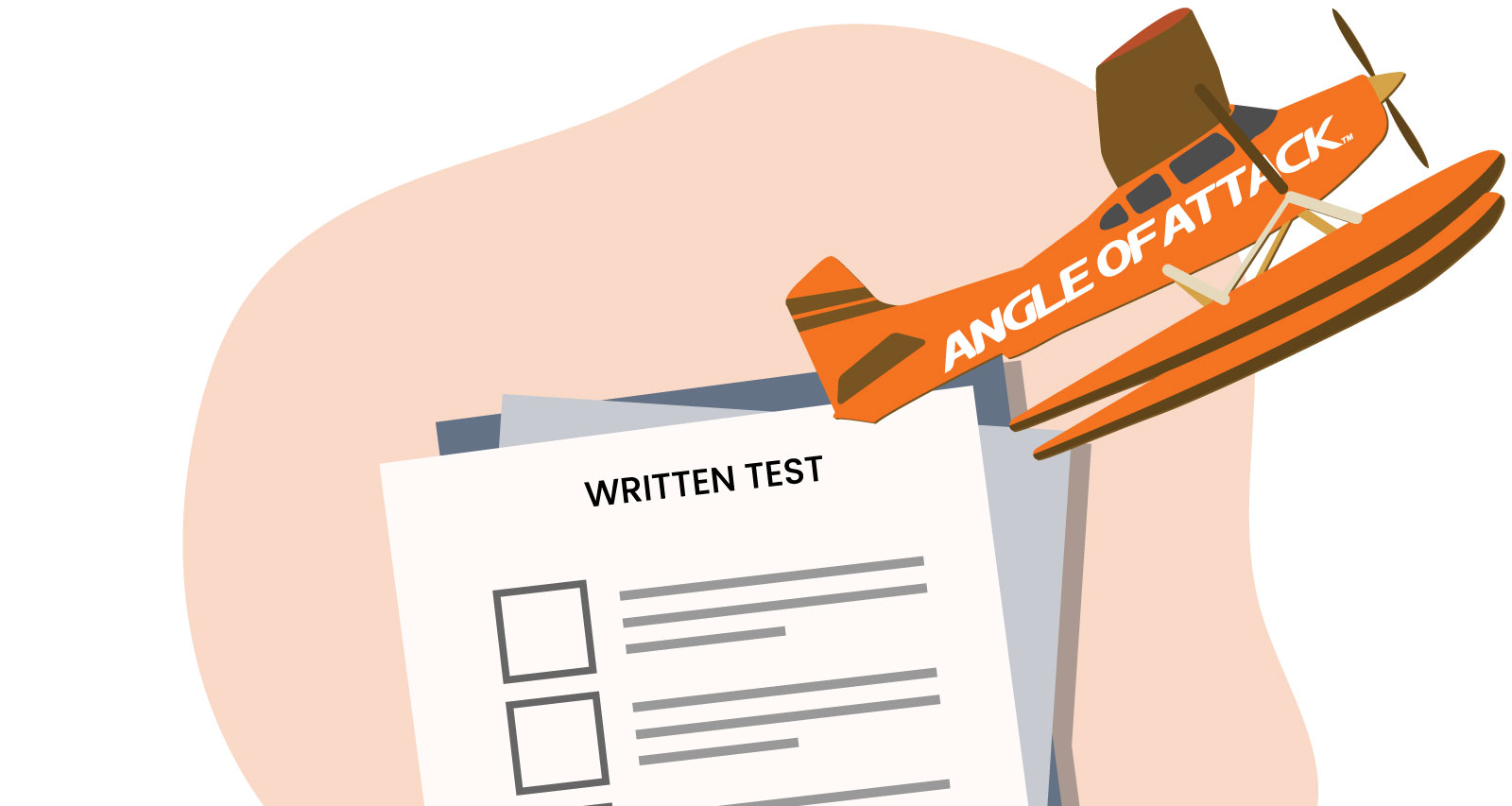
Is it the hardest part of the hardest checkride of your pilot life? Or is it all bark and no bite?
Whatever you think of the Instrument Rating oral examination, it has a reputation as one of the most intense oral exams of any pilot’s flying career. It’s designed to be tough, but for the prepared pilot, it can be just another day at the airport. Today we will break down what’s covered during the instrument oral and how difficult it really is. Then the best way to study for the instrument oral from both a knowledge and practical perspective. Put up the foggles and let’s pull out the charts…
Instrument Rating Oral Exam
Just like your Private, studying for the Instrument Rating oral exam will begin directly before the in-flight portion of your checkride. The sit-down oral examination will typically last between 1-2 hours. It covers a wide range of topics similarly covered during your FAA Knowledge Test and in the Aeronautical Information Manual.
While the requirements of what is covered are the same, every Designated Pilot Examiner (DPE) conducts their oral exam differently. For some the oral is a conversation; for others, it’s a grilling interview. Also, don’t be fooled that the oral is over as soon as you leave the conference room. The FAA says that oral questioning can and should continue into the in-flight phase (this means a pre-flight checklist can be subject to some questioning as well).
Is the Instrument Checkride Difficult?
The instrument checkride is challenging but conquerable. More so than any other checkride, the instrument checkride has the slimmest margin for error. That being said, per year there are more instrument ratings issued than any other pilot certificate or rating.
If you’re debating the value of getting an instrument rating check out this “1 minute Wings” clip Chris did about why private pilots need to get their instrument rating. In short, even if you never fly into a cloud, an instrument rating will help you avoid the number one pilot killer: VFR (visual flight rules) flight into IMC (instrument meteorological conditions). 68% of the pilot population has an instrument rating, and for good reason– it makes you a better pilot. The instrument checkride may be difficult but once you come out the other side you will be a more confident and equipped aviator.
How do you Study for Oral Checkride?
Practice, Practice, Practice. 88 beats per minute. That was how low Buzz Aldrin’s heart rate was on liftoff for the moon on Apollo 11. How? Practice. Aldrin says that the reason he and all the other Apollo astronauts could keep their nerves under wraps was that they simulated their flights so many times. So when they actually lit that candle it was a walk in the park.
Thankfully, you aren’t going to the moon, but you can still learn a lesson from Buzz. Practice cools the nerves and increases performance on the day of the checkride, particularly for the oral portion. One of the best things you can do is have an instructor simulate a mock instrument oral exam with you.
Try to recreate the test conditions almost exactly. Even down to the seemingly trivial variables. If your flight school has multiple instructors, try and schedule a mock oral with an instructor you don’t usually fly with. (Remember your DPE is likely going to be a fresh face). Perfect practice makes perfect. Try to eliminate as many unknowns as possible. It will make you more comfortable on your checkride day.
Tab your FAR- Organization Outside the Cockpit
One of the best ways to help yourself on the oral is to be organized. When most people think of cockpit management, they think of having your checklist in the right spot so you’re not searching on the cabin floor. But good cockpit management on the checkride begins in the oral.
Have all your paperwork, charts, and logs easily accessible for the DPE to read. One of the most common reasons a checkride is discontinued is not because a student fails a subject on the oral, but because there was a paperwork problem. Both you nor the DPE don’t want that.
Additionally, tab, highlight, bookmark, etc… your FAR-AIM. You aren’t going to get every question right on the oral. (Heck, I doubt even Jimmy Doolittle, the inventor of the instrument flight, would get every question right on the oral.) But the best thing to do if you don’t know an answer is (1) admit it and (2) offer to look it up in the FAR or a relevant source. The worst thing you can do is blindly guess.
A DPE would much rather see you admit you don’t know the “GRABCARD” requirements and open a nicely tabbed FAR than have you wrongly guess over and over again. A pilot is not expected to know everything. A pilot is expected to know where to find the right answer.
Understand What You Missed on Your Written Test
On the oral, A DPE is required to go over what you missed on your FAA Instrument Knowledge Test. The better you do on your written test, the less amount of time your oral will normally take. They won’t know the specific question you missed, but they will know the type of question you missed.
Your instructor is supposed to go over any areas you missed before sending you to your checkride. Sometimes this is more of a formality than an actual teaching moment. Don’t slack off here and say to yourself– “well I guess I just don’t know holding pattern entries. I’ll just wing it on the oral.” That’s not going to happen.
A typical DPE will see you missed four questions about holding patterns on the written and spend 40 minutes on that subject and only two minutes on a topic you know like the back of your hand.
Once you get your knowledge test back, you should then go back to your Angle of Attack Online Instrument Ground School and rewatch the topics you struggled with. Once you purchase our Online Instrument Ground School Course your access doesn’t ever expire. It’s actually encouraged that you watch and then rewatch topics you struggle with even long after you get your instrument rating. Remember ground school for the great pilot doesn’t end after you get your ticket.
Do some research on your DPE
Every DPE is different. Some DPEs want their students to go through a more thorough icing analysis than the local weatherman; others will hound you on instrument failures.
One of the best things I did to prepare for my instrument oral, was to talk to former students who had my same DPE and passed. They gave me some good tips and quirks to look out for. Obviously, you should want to be on top of every type of question. It’s not cheating to find out your DPE in a former life was a loadmaster on a C-130 Hercules. Or if they love talking about weight and balance calculations.
IFR Oral Test Prep
As mentioned, much of your test prep for the oral will be verbalizing similar types of questions on the written test. So, it makes sense that whatever you used to study on the written should be referred to when prepping for the oral. For most, that’s looking back at Ground School.
Angle of Attack’s Online Instrument Ground School is available on any device that gets internet access, meaning you can prep for your oral listening in the car on the way to work or at night on your internet-enabled TV. Additionally, our Instrument Checkride ACE gives you a breakdown of all topics you’ll likely encounter on all parts of your checkride, including the oral. The Checkride ACE will help you organize all your documents so you come in prepared for a smooth-sailing oral exam!

Michael Brown grew up flying on the banks of the Tennessee River in Chattanooga, TN. He obtained his private pilot’s license in high school and has instrument and seaplane ratings. Michael graduated from Texas Christian University, where he founded the school’s flying club, with a double major in Business and Communications. He is currently a law student at Tulane University, studying transportation law. Michael was named the Richard Collins Young Writing Award winner and has had his legal writing recognized by the American Bar Association’s Air & Space Subcommittee. When he is not flying or studying, Michael enjoys riding his bike and cheering on his Atlanta Braves.

Stay Connected
Be the very first to get notified when we publish new flying videos, free lessons, and special offers on our courses.






